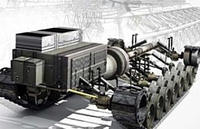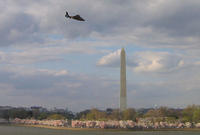-
Military systems hibernate on the sea floor, then woken up remotely
Almost half of the world’s oceans are more than four kilometers deep. This provides considerable opportunity for cheap stealth, but the vastness and depth make retrieval costs prohibitive. DARPA wants to developing deployable, unmanned, distributed systems which hibernate on the deep-ocean floor in special containers for years at a time. These deep-sea nodes would then be woken up remotely when needed and recalled to the surface
-
-
DARPA’s first FANG Challenge begun yesterday

More than 700 participants, organized in 150 teams, yesterday begun collaboration to design the mobility and drivetrain systems of a next-generation, amphibious infantry fighting vehicle. The goal of the competition is to compress the design-to-production time of a complex defense system by up to a factor of five.
-
-
New York to make state’s strict gun laws even stricter
New York State is nearing an agreement on a proposal to put some of the toughest gun-control laws into effect. The laws include expanding the definition of banned assault weapons, limiting magazines to seven rounds, and requiring background checks on people who buy ammunition
-
-
Neutralizing the effects of lethal chemical agents
Organophosphorus agents (OPs) are used both in farm pesticides, and by terrorists and rogue states. About 200,000 people die each year across the world from organophosphorus agents (OP) poisoning, through occupational exposure, unintentional use, and misuse, mostly in developing countries like India, Pakistan, and Sri Lanka and through deliberate terrorist activities. OPs include compounds like Tabun, which was developed in 1936 by German scientists during the Second World War, Sarin, Soman, Cyclosarin, VX, and VR. Researchers develop an enzyme treatment which could neutralize the effects of OPs.
-
-
Teacher talks a California high-school shooter into putting down his gun
A 16-year old Taft, California high school student brought a shot gun to school yesterday, carrying enough ammunition with him to kill many people; after shooting and injuring one student in a science class, he shot the teacher, but the bullet only grazed the teacher’s head; the teacher and another staff member then engaged the gunman in conversation, allowing teachers in other classrooms time to lead their students out of the building; the two men persuaded the gunman to put his gun down, and he was arrested by the police
-
-
Powerful stun guns popular in U.K.

Possessing a stun gun in the United Kingdom can carry a jail sentence of ten years, but the police keep seizing hundreds of stun guns every year; U.K. law enforcement agencies have investigated more than 200 crimes in the last three years involving stun guns, and that in those three years almost 500 stun guns have been seized by police
-
-
Biden hints at executive action on gun violence
Vice President Biden on Wednesday said the White House could use executive orders to advance gun control measures. Biden held a series of meetings Wednesday in the White Housed on the topic of gun violence and the ways to reduce it; in a meeting with gun-safety and victims groups, Biden said: “There are executive orders, executive action that can be taken,” adding: “we haven’t decided what that is yet”
-
-
Instant DNA analysis worries privacy advocates
In the past, it took weeks to analyze a person’s DNA, but with new technology it can take less than a day, and in most cases less than two hours; Rapid DNA analyzers can process a DN sample in less than ninety minutes; these machines, the size of a household printer, are now being marketed to local, state, and federal law enforcement agencies around the country; privacy advocates worry
-
-
Laser weapon tracks, destroys drones, mortar rounds in mid-flight
A 50kW high energy laser (HEL) weapon technology demonstrator successfully passed demanding tests in Switzerland; in the first test, a massive, 15mm-thick steel girder was cut through from a distance of 1,000 meters; even more impressively, the HEL shot down several nose-diving target drones at a range of two kilometers; the drones were flying at speeds over 50 meters a second, but the system’s radar had no trouble picking up the incoming unmanned aerial vehicles at a distance of three kilometers, before they were destroyed by the laser beam at a 2-km range; the HEL also tracked and destroyed a steel ball measuring 82 mm in diameter and travelling at approximately 50 m/sec – replicating a mortar round – in mid-air
-
-
Florida university distances itself from professor's claim that Sandy Hook shooting was staged by the government
A Florida university professor publicly questioned whether the Newtown, Connecticut shooting happened, or whether it was a government drill, forcing his employer, Boca Raton-based Florida Atlantic University, to distance itself from him; professor James Tracy also raised questions about whether the Aurora, Colorado movie theater shooting ever happened
-
-
Portable X-ray source offers a mobile terrorism prevention tool

The hand-held scanners, or tricorders, of the Star Trek movies and television series are one step closer to reality now that a engineers have invented a compact source of X-rays and other forms of radiation; the radiation source, which is the size of a stick of gum, could be used to create inexpensive and portable X-ray scanners for use by doctors, as well as to fight terrorism and smuggling and aid exploration on this planet and others
-
-
A dandelion-shaped device to help in demining operations
Decades of war have left land mines buried all over the Afghan countryside; they continue to go off, killing and maiming hundreds of innocent people every year; last year alone, more than 812 people were wounded or killed in Afghanistan because of mines left behind after the armies retreated; two Afghan inventors designed a dandelion-like device for demining operations
-
-
Emergency management technology is customized for use in school security
School shootings are a very real fear for parents and school administrators, and a Ohio company has customized its emergency response solution for use in schools; the Web-based system which gives first responders eyes-on access to critical situational information, such as maps, floor plans, emergency protocols, call lists, and real-time video feeds where there are cameras
-
-
Helicopter monitors radiation levels in Washington, D.C.

For the last week, a National Nuclear Security Administration (NNSA) helicopter has been flying over Washington, D.C., measuring naturally occurring radiation levels; the purpose is to establish a baseline of radiation levels so that abnormal spikes – occurring, for example, as a result of exploding a dirty bomb — may be readily detected
-
-
White House considering gun-control measures beyond assault weapons ban
Sources in the White House say the administration is considering a broader and strategy on guns control in the wake of the Newton, Connecticut, mass shooting; the approach being considered will go farther than a ban on certain types of assault weapons; the Biden task force, which will submit its recommendations to President Obama in a few weeks, is leaning toward adoption of measures recommended by the law enforcement community, among them requiring universal background checks for firearm buyers, tracking the movement and sale of weapons through a national database, strengthening mental health checks, and stiffening penalties for carrying guns near schools or giving them to minors
-
More headlines
The long view
Why Ukraine’s AI Drones Aren’t a Breakthrough Yet
By David Kirichenko
Machine vision, a form of AI, allows drones to identify and strike targets autonomously. The drones can’t be jammed, and they don’t need continuous monitoring by operators. Despite early hopes, the technology has not yet become a game-changing feature of Ukraine’s battlefield drones. But its time will come.
